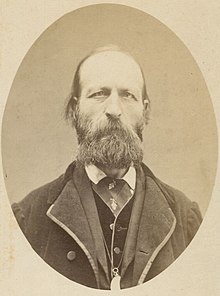Jules Allix
Jules Allix (* 1818 in Fontenay-le-Comte , † 1903 in Paris ) was a French journalist and politician. He was active in the Paris Commune and was committed to socialism and women's rights . But Allix also excelled with bizarre views and utopian projects that repeatedly questioned his state of mind.
Life
Jules Alix came from the strongly conservative Département Vendée and was a lawyer. His candidacy for the constituent national assembly after the February Revolution of 1848 failed. Due to his rigorous rejection of the Second Empire , justified by the Republicans , he was banished from France and spent eight years in Jersey , where he met Victor Hugo . It is reported that he believes there 1854-1855 seances with table-turning participated and mentally ill. In 1860 he was able to return from exile, in 1865 and 1866 he had to be treated in the Charenton asylum for the mentally ill . In 1871 he was elected to the council of the Paris Commune as a representative of the eighth arrondissement , but this too had him included as a psychiatric case because of his eccentricity. His reputation as a mentally ill person may have saved his life after the fall of the commune. In 1876 he was released a second time from Charenton asylum and received political amnesty in 1879. He then got involved in the women's organization of Maria Deraismes .
Jules Allix excelled with several utopian projects. He had the idea of transforming Paris into a port city by the sea, he wanted to connect Saumur to the Loire with a navigable tunnel , and he believed he had implemented the concept of the perpetual motion machine in several motors. Last but not least, he remembered his enthusiastic newspaper report about the Pasilalin-sympathetic compass , a "snail telegraph" based on the mistaken notion that two snails entered into a permanent, spatially unlimited telepathic connection when they mated. The astronomer Camille Flammarion called Allix “ esprit imaginatif ” (German: “imaginative spirit”) and “ simple rêveur ” (German: “simple dreamer”).
Web links
- Département des Connaissances Oubliées et Livres Maudits . Aghateum.org
- Daniel Zinser: D'Allix en Allais .
- Camille Flammarion: Mémoires biographiques et philosophiques d'un astronome . ( Memento of September 26, 2007 in the web archive archive.today ) Paris 1912, pp. 483–484
| personal data | |
|---|---|
| SURNAME | Allix, Jules |
| BRIEF DESCRIPTION | French journalist and politician, active during the Paris Commune |
| DATE OF BIRTH | 1818 |
| PLACE OF BIRTH | Fontenay-le-Comte , France |
| DATE OF DEATH | 1903 |
| Place of death | Paris , France |
